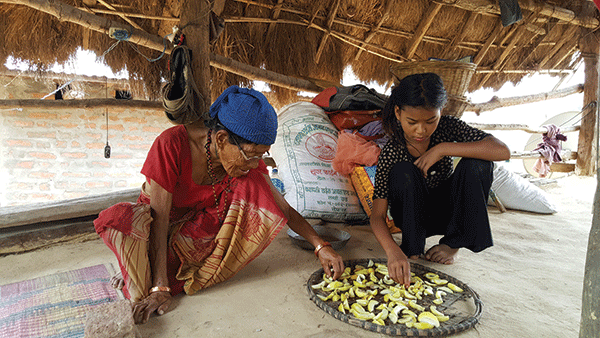Refresh yourself with the season's treats - the delicious, juicy and healthy fruits of summer!
The hottest time of the year is here. Summer is the time for fun and happiness—to go out and enjoy, letting our skin breathe with the lightest of fabrics while soaking in the brilliant radiance of the sun. Yet, it is also the time when dehydration and skin problems peep in. Although the scorching heat takes a toll on our energy, staying cooped up inside to avoid melting is definitely not an option. If you're sweating buckets this summer (which you definitely are), it's time to replenish and hydrate your system pronto. And the best way to do that? Hydrating summer fruits.
Watermelon
Nothing screams summer-time like a big wedge of watermelon. It’s time to bring this summer staple for picnics and barbecues back into your diet. As the name "water-melon" spells it out for you, watermelon is 90% water, which actually makes it the yummier version of water that will keep you well-hydrated in the heat. Along with successfully battling dehydration,it also maintains the electrolyte balance with its sodium and potassium content.
According to Tanya Zuckerbrot, registered dietitian and creator of The F-Factor Diet"The pink flesh contains lots of vitamins C and A, and the antioxidant lycopene, which help in protecting you from the sun. This is the perfect snack to cool off and replenish electrolytes that are lost as you sweat in the sun." Lycopene also aids in the prevention of cancer and cardiovascular disease, and greatly reduces skin damage.
Many of you must be planning to get in shape this summer, and for that, watermelon is g-r-e-a-t. It has no fat, and can satisfy your sweet craving without shooting the blood glucose levels too high. The amino acid L-citrulline also makes watermelon a healthy post workout snack, as it assists in improving recovery time, besides reducing muscle soreness. Juicy, delectable, and healthy, watermelon is the ultimate summer super fruit.
Tip: Toss cubes of watermelon with crumbled feta, a trickle of olive oil and balsamic vinegar, and a sprinkle of fresh basil leaves fora heat-blasting salad.
Mango
All Nepalis have two Ms in common—momos and mangoes. There's hardly anyone who doesn't like mangoes. Let summer come, and mangoes are a must for afternoon snack, or as an after-meal sweet dish. Everyone seems to have their own way to enjoy this delicacy of a fruit; my grandmother, for instance, loves to have it bhaatsangamuchhera (teamed up with rice).
While multiple commercial ads of mango juice claim that they satisfy the mango craving, we all know better, don’t we? So let's skip Katrina's aamsutra adverts and focus on the real fruit, the unbeatable ‘king of fruits’. Chilled mangoes and mango smoothies are the juiciest way to cool off. Along with that, mango is an excellent source of vitamin A and flavonoids, which are essential for good vision. Packed with antioxidants like vitamin A, C, and E, mangoes enhance immunity and keep your skin clear and glowing.
For those with tangy taste buds, unripe mangoes can send a combination of different flavors gushing through your tongue. Richly loaded with pectin, unripe mangoes when steamed and juiced with cumin (jeera) and salt, also make for an excellent remedy for heat strokes and exhaustion in summers.

Peach
With its succulent texture and sweet tang, peach, or aaru, is a favorite of many. Keep a bowl of peaches on your table while you work, and you won't realize when you finish the entire bowl while carelessly popping one or two into your mouth. That’s all right, since peaches are super healthy. Consuming peach regularly helps control cholesterol levels in the blood. Furthermore, they contain bio-active compounds that help fight metabolic syndrome, a combination of risk factors that cause inflammation, obesity, and cardiovascular problems.
In Hungary, peach is referred to as the “fruit of calmness”, as it relieves stress and anxiety and restores the calmness of mind. Also, its flowers are particularly beneficial for overcoming restlessness. Dried peaches are advisable for those who are anemic and over-fatigued, according to the experts. So, take them with the skin for breakfast to get your daily dose of vitamin A, vitamin B2, and potassium, and everything will be just peachy!
Lychee
Extraordinarily sweet, fragrant, juicy, and fleshy, this Chinese symbol of romance and love, this white fleshed edible gem of a jelly, lychee, definitely has our entire predilection. It is an excellent source of vitamin B-complex, which is vital for energy production. Oligonol, found abundantly in lychees, helps improve blood flow to organs, reduces weight, and protects the skin from the sun’s damaging UV rays. High in water content, they are exceptional coolants that help prevent internal blood clots and severe cell damage, as well. Fluctuation in temperature between day and night in summer is the major cause of low energy levels. This makes the body vulnerable to a host of diseases and aches, all of which can be prevented by eating lychees. Lychees have also been proven to reduce strokes by up to 50% in heart patients.
All Nepalis have two Ms in common— momos and mangoes. There's hardly anyone who doesn't like mangoes. Let summer come, and mangoes are a must for afternoon snack, or as an after-meal sweet dish.
Papaya
From blended-up smoothies to mixed fruit bowls topped with granola, papaya is served everywhere. The red-orange color reminds me of summer in the tropics. My favorite way to enjoy this fruit is to get a chilled one, and simply scoop it straight out from the skin with a spoon.
Along with its great taste, you can also reap abundant health benefits from papaya. Whether it's the harsh sun or the humid monsoon during summer, papaya is capable of soothing, toning,and moisturizing your skin, leaving your skin glowing naturally. Its natural properties will also remove your skin blemishes, pimples, and dark patches. No wonder it's featured in so many beauty products! Along with its vitamin content and nutritional benefits, papayas aid in digestion and treating intestinal worms, relieve pain for those suffering from arthritis, edema, and osteoporosis, and reduce the risk for cancer and heart attack. Already headed to the grocer's, aren't you?
Cucumber
Although cucumber is scientifically classified as a veggie, how could it not make it to our list when they make it to our sandwiches, raitas, salads, green smoothies, kakroachaar, and what not? The phrase, “cool as a cucumber”, is truly said, as cucumber's high water content, together with its fresh and crunchy taste, makes it perfect for summer. It has a diuretic property (especially useful in the dry summer months), which acts to flush toxins out of the body and keeps the tissues of the skin healthy. Cucumber is extremely low in calories and has minimal amounts of sugar, carbohydrates, and fats. Additionally, it provides the body with essential nutrients, vitamin B, phosphorus, calcium, zinc, folic acid, fiber, and other minerals.
Well, I know it's tempting while grocery shopping to stock up on chilled drinks, ice creams, and popsicles for those refreshing cool treats (without realizing what you are actually stocking up on —artificial flavors, synthetic sweeteners, and tons of calories). But if you really want to beat the heat, then skip the junk and grab these in-season fruits that work wonders for your body while keeping you cool and hydrated as the temperature soars.











